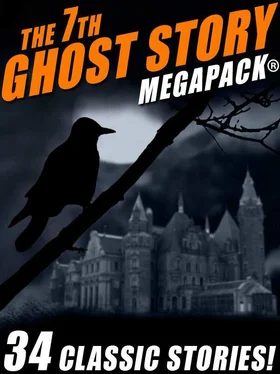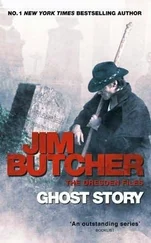They went to Brighton, and it really seemed as if Ned was right, and that the woman at the window had been merely a nervous creation. It seemed so, that is, for nearly three weeks, and then the climax came.
It was in the twilight—she had always been part of it—that Gilbert Dent saw her again; the woman that he had found lying dead.
They were walking, the two brothers, along the cliffs.
The wind was blowing in their faces, the sea was booming beneath the cliff. Ned had just said it was about time they turned back to the hotel and had some dinner, when Gilbert with a cry leapt forward to the very edge of the flat grass path on which they were strolling. The movement was so sudden that his brother barely caught him in time. They struggled and swayed on the very edge of the cliff for a second; Gilbert, possessed by some sudden frenzy, seemed resolved to go over, but the other at last dragged him backward, and they rolled together on the close, thick turf.
At this point Gilbert opened his eyes and tried to get on his feet.
“Better?” asked his brother, cheerfully, holding out a helping hand. “Strange! The sea has that effect on some people. Didn’t think that you were one of them.”
“What effect?”
“Vertigo, my dear fellow.”
“Ned,” said the other solemnly, “I saw her. It is not worth your while to try to account for anything. I have been inclined to think that you were right—that she, the woman at the window, was a fancy, that I had fallen in love with a creation of my own brain; but I saw her again tonight. You must have seen her yourself—she was within a couple of feet of you. Why did you not try and save her? It was nothing short of murder to let her go over like that. I did my best.”
“You certainly did—to kill us both,” said Ned, grimly.
Gilbert gave him a wild look.
After luncheon Ned persuaded him to rest—watched him fall asleep, and then went out.
In the porch of the hotel he was met by a waiter on his return who told him that Gilbert had left about a quarter of an hour after he had himself gone out.
Directly he heard this he feared the worst; having, as is usual in such cases, a very hazy idea of what the worst might be. Of course he must follow without a moment’s delay; but a reference to the time-table told him that there was not another train for an hour, and that was slow.
It was already getting dusk when he arrived there. He felt certain that Gilbert would go there. He got to the end of the lane and walked up it slowly, examining every house. There would be no difficulty in recognizing the one he wanted; Gilbert had described it in detail more than once.
He stood outside the loosely hanging gate at last, and stared through the darkness at the shabby stucco front and rank garden.
He went down a flight of steps to the back door, and finding it unfastened, stepped into a stone passage. It was one of the problems of the place that he should have avoided the main entrance door with a half-admitted dread, and that, only half admitting still, he was afraid to mount the long flight of stone stairs leading from the servants’ quarters. However, he pulled himself together and went up to the room.
It was quite dark inside. He heard something scuttle across the floor; he felt the grit and dust of years under his feet. He struck a match—just as Gilbert had done—and looked first at the recess in which the window was built. The match flared round the room for a moment and gave him a flash picture of his surroundings. He saw the stripes of gaudy paper moving almost imperceptibly, like tentacles of some sea monster, from the wall; he saw a creature—it looked like a rat—scurry across the floor from the window to the great mantelpiece of hard white marble.
If he had seen nothing more than this.
He saw in detail all that the first match had flashed at him. He saw his brother lying on the floor; a ghastly coincidence, his hand was caught round the edge of the work-table as hers had been. The other hand was clenched across his breast; there was a look of great agony on his face.
A dead face, of course. This was the end of the affair. He was lying dead by the window where the woman had sat every night at dusk and smiled at him.
The second match went out; the brother of the dead man struck a third. He looked again and closely. Then he staggered to his feet and gave a cry. It rang through the empty rooms and echoed without wearying down the long, stone passages in the basement.
Gilbert’s head was thrown back; his chin peaked to the ceiling. On his throat were livid marks. The doctor saw them distinctly; he saw the grip of small fingers; the distinct impression of a woman’s little hand.
* * *
The curious thing about the whole story—the most curious thing, perhaps—is that no other eye ever saw those murderous marks. So there was no scandal, no chase after the murderer, no undiscovered crime. They faded; when the doctor saw his brother again in the full light and in the presence of others his throat was clear. And the post mortem proved that death was due to natural causes.
So the matter stands, and will.
But where the house and its overgrown garden stood runs a new road with neat red and white villas.
Whatever secret it knew—if any—it kept discreetly.
Ned Dent is morbid enough to go down the smart new road in the twilight sometimes and wonder.
THE GHOSTS OF RED CREEK,
by S.T.
Taken from Twenty-Five Ghost Stories (1904).
To the northward of Mississippi City and its neighbor, Handsboro, there extends a tract of pine forest for miles with but few habitations scattered through it. Black and Red Creeks, with their numerous branches, drain this region into the Pascagoula River to the eastward. With the swamps of Pascagoula as a refuge, and the luxuriant and unfrequented bottoms of Red and Black Creeks to browse upon, there are few choicer spots for deer. Knowing this fact, a small party of gentlemen on the day before a crisp, cold Christmas, started from Handsboro in a large four-wheeled wagon for a thirty-mile drive into this wilderness of pine and a week’s sport after the deer. The guide was Jim Caruthers, a true woodsman, and the driver and general factotum, a jolly negro named Jack Lyons, than whom no one could make a better hoe-cake and cook a venison steak. His laugh could be heard a quarter of a mile, and his good nature was as expansive as the range of the laughter.
The usual experiences of a hunting camp were heartily enjoyed during the first days of this life out of doors; but its cream did not rise until about the fifth night, when, from familiar intercourse, Jack Lyons became loquacious, and after the day’s twenty or twenty-five-mile walk, would spin yarns in front of the camp fire, which brought forgetfulness of fatigue.
The night before New Year’s was intensely cold. The cold north wind of the afternoon had subsided at sunset, and only a gust now and again touched the musical leaves of the pines, making them vibrant with that mournful score of nature’s operas which even maestros have failed to catch.
In front of two new and white tents two sportsmen reclined at length within reach of the warmth of the fire, while opposite them rested at ease the guide and the worthy Jack Lyons.
Wearied with the day’s chase four stanch hounds—Ringwood, Rose, Jet and Boxer—were dreaming of future quarry.
The firelight brought out in bright relief the trunks of the tall pines like cathedral columns, and sparkling through the leafy dome overhead the scintillating stars glistened with a diamond brightness. A silence which added its influence to the scene rested about the borders of the creek below, and gave more effect to the story of the veteran teamster than perhaps it otherwise would have had.
Читать дальше












